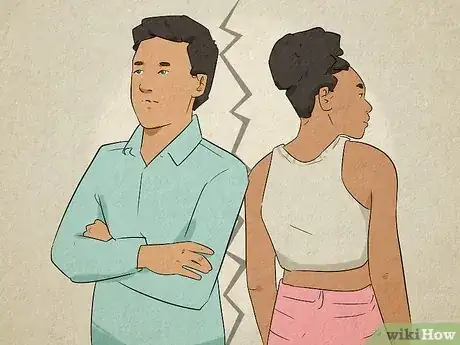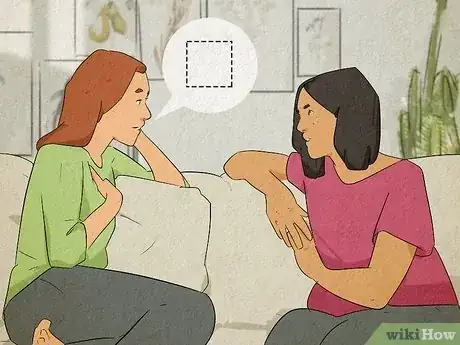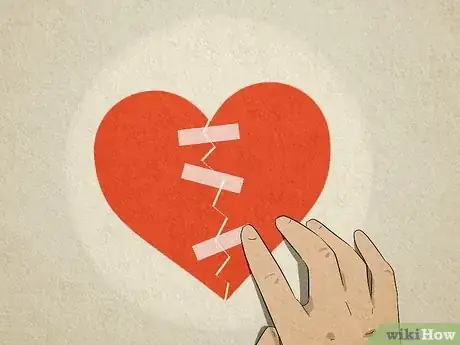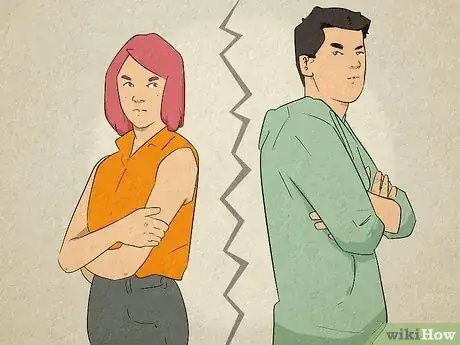This article was co-authored by John Keegan. John Keegan is a dating coach and motivational speaker based in New York City. He runs The Awakened Lifestyle, where he uses his expertise in dating, attraction, and social dynamics to help people find love. He teaches and holds dating workshops internationally, from Los Angeles to London and from Rio de Janeiro to Prague. His work has been featured in the New York Times, Humans of New York, and Men's Health.
There are 8 references cited in this article, which can be found at the bottom of the page.
This article has been viewed 15,017 times.
It’s normal for a relationship to hit the occasional rough patch, whether you’re regularly bickering or your careers keep you apart more often than you would like. There are many ways you can try to fix a relationship, and you might find yourself wondering whether taking a break is a good idea. Some experts say that done right, a break can actually be healthy and perhaps improve a relationship—even one that felt fine to begin with.[1] So while it can be nerve-wracking to think about sometimes, taking a break might not be as scary—or as unhealthy—as it can seem at first. It's really a question of why and how you do it that will determine whether it's a good idea. Keep reading to learn when it’s a good (or bad) idea and how to make sure you do it right.
Steps
How to Take a Break Healthily
-
1Set a timeframe or schedule regular check-ins. You don’t want the break to be too short or to stretch on indefinitely, as you risk either creating an unproductive break or adding stress to the relationship. That said, deadlines can be counterproductive for some people: It’s easy to get stressed out feeling the need to fix everything within a certain timeframe, or conversely fall into the trap of thinking that everything will sort itself out on its own by said deadline. As such, setting check-in dates can help relieve the sense of a definitive end date while reducing the risk of letting the break go on indefinitely.[3] For others, deadlines help them buckle down and focus on self-improvement within the given timeframe. It really depends on the couple, so decide together whether a fixed deadline or committing to regular check-ins is the right call for you.
- If you choose the check-in route, decide together whether you want to talk daily, weekly, or monthly.
- Check-ins will allow you to play it by ear in deciding when the break should end, but if you go this route, you still need to be mindful of the length of the breakup.
- The ideal length for a break is between a week and a month, though it can vary from couple to couple.[4]
- Six months is likely too long.[5]
-
2Reduce or eliminate communication. If you live together, you might even consider trying to find separate places to stay for one or both of you—perhaps friends or family members.[6] This can help you not only to focus on the purpose of the break, but also to identify toxic communication habits that you might not even realize you had. These are things you might want to acknowledge and work on down the road.[7]
- Was one of you constantly interrupting the other?
- Were you regularly giving each other the cold shoulder during or after arguments?
-
3Identify boundaries and rules. Making sure that you’re both on the same page when it comes to what is or isn’t okay during the break will help reduce further harm and arguments down the road.[8] [9] Some questions you might want to ask yourselves include …
- Is it okay to hook up with and/or date other people during the break?
- If infidelity is part of the equation, how do you feel about you or your partner communicating with the other person or people who were involved?
-
4Set goals and allow each other the space to work on them. Communicating these goals clearly can help both you and your partner.
As with your boundaries, being on the same page will make the break more productive and less potentially hurtful. Are you hoping to figure out your feelings? Or perhaps you simply want some space to explore separate interests or aspirations? Whatever your goals, how do you plan to accomplish them? Laying all of this out not only ensures that you’re on the same page as your partner, but can help you take action in areas where it might otherwise be easy to lose motivation. [10]
-
1
- That said, remember that you’re both individuals with different ways of working through your issues and toward your goals.
- You might find that journaling is the best way for you to sort out your feelings, while talking to friends or family works best for your partner.
- There’s no one “correct” way to achieve your goals or work through your emotions, so allow each other the grace to take different approaches.[11]
When Taking a Break Is Healthy
-
1You’ve hit a rough patch, but you still want to make it work. In cases where you’re having relationship woes, but you legitimately want to work things out, it’s important to look for other resolutions first, such as talking through the issues.[12] If these first-ditch attempts still don’t help, then a break might be called for. That said, make sure you’re doing it for the right reasons and with the right attitude. This should be a time of self-reflection, re-evaluation, and self-improvement. You might need a break if ...[13]
- You argue frequently and have trouble resolving the arguments through direct communication.
- One or both of you cheated—either physically or emotionally—and you need time to process the infidelity.
- One or both of you is struggling with commitment.
- You feel like you can’t truly be yourself in the relationship.
-
2A big life event happens. Needing a break in a relationship isn’t always the result of problems between you and your partner. Sometimes life just gets in the way. Either way, you might need some space to focus on the event without your partner. No matter how much you love them, sometimes working through the emotional toll of a loss or dealing with the practical elements of adjusting to a new situation (e.g. a new job) is best done on your own or with other friends or family members. This can especially be the case if your partner is working through their own milestones, tragedies, or setbacks. In these cases, you often don’t have the bandwidth to be there both for each other and for yourselves.[14]
- These events can be positive milestones such as landing a new job or getting accepted into a college or grad school.
- They can also be sources of tragedy or stress, such as dealing with addiction or the loss of a loved one.
- You might even find that taking a break strengthens your relationship in the long run by allowing you the space you need. Sometimes time apart even makes the heart grow fonder!
-
3You simply need some space. Wanting space is often considered taboo or a red flag, but all couples need it to some extent, even when the relationship is otherwise fine. If you enjoy different hobbies or want to take separate vacations, a break can help you enjoy time apart in a way that might even strengthen your relationship in the long run. In this situation, the break allows you both to explore your separate interests, and the time apart can help you appreciate each other even more than if you spent all your time together.[15]
- Maybe you like going to the movies with friends while your partner likes to go hiking.
- Or perhaps your dream vacation involves kayaking around the Northern Gulf Islands while your partner prefers to play tourist in Paris.
When Taking a Break Is a Bad Idea
-
1You’re pretty sure you actually want to break up. It’s always tough to break up, and a “break” can be a tempting way to either soften the blow or to ease the fear of finality that comes with a breakup. That said, you don’t want to prolong hope when there is none, as this can end up backfiring. Your partner might end up feeling hurt and strung along in the process, so it’s often best to rip off the band aid quickly if you’re using a break as a way to ease into or delay an inevitable breakup.[16] Some strategies to make a breakup easier can include (but aren't limited to) ...
- Planning out the breakup conversation in advance.
- If possible, making sure to discuss the breakup in person.
- Sharing positive feedback and appreciation for the good aspects of your relationship.
- Reminding yourself that some hurt feelings may be inevitable, but that the pain will be temporary.[17]
-
2You’re doing it out of anger. Make sure that you don’t make any rash decisions. Even if you decide to go forward with a break, both you and your partner should be able to calmly talk through the logistics so that you’re both on the same page going forward. These aren’t decisions that you want to make—or fail to make—in anger.[18] Some questions you might want to ask each other include ...
- Are you both okay with seeing other people?
- What is or isn’t okay to do while you’re on the break?
- What—if any—deadline should you set on the break?
- Should you communicate at all during the break? If so, how often and for what reasons?
-
3One or both people are using it as a manipulation tactic. Aiming to “show them what they’re missing” is often unhealthy and won’t necessarily be as effective as you think. For instance, if you flaunt the idea that you’re putting yourself out there, it might simply result in more hurt feelings and further rifts. Rather than using it as a scare tactic or punishment strategy, try to use a break to work on yourself and your role in the relationship.[19] Try to avoid (or watch out for) tactics such as ...
- Flaunting the fact that you're exploring other relationships.
- Trying to "tease" your partner about what they can't have during a break.
- Conversely, trying to guilt your partner by showing or telling them how awful the break makes you feel. Expressing negative feelings isn't necessarily unhealthy in all situations. The key is to communicate honestly rather than using your feelings to guilt trip your partner or to shift responsibility for your mental health onto them.
-
4The relationship feels rushed. Sometimes it feels as though a relationship is going too fast or as though you can’t focus on it as much as you should. This, in turn, can trigger a fear response. But there’s a better solution in this situation: Take it slow. Slowing down the relationship can decrease the sense of fear and give you the breathing room you need while still getting a feel for your dynamics as a couple.[20]
- Perhaps the relationship feels too serious—it's okay to say that you want to keep it casual for a while.
- Sometimes it might feel as if you're spending too much time together, especially if you're still in the early stages of a relationship. If that's the case, try spending a bit more time apart while still going on the occasional date.
- If you feel like you're getting too intimate too fast, discuss pumping the brakes with your partner. You can still enjoy each other's company without rushing into anything.
References
- ↑ https://globalnews.ca/news/3364684/taking-a-break-from-your-relationship-here-are-the-dos-and-donts/
- ↑ https://www.oprahdaily.com/life/relationships-love/a32256623/taking-a-break-in-a-relationship/
- ↑ https://www.oprahdaily.com/life/relationships-love/a32256623/taking-a-break-in-a-relationship/
- ↑ https://globalnews.ca/news/3364684/taking-a-break-from-your-relationship-here-are-the-dos-and-donts/
- ↑ https://globalnews.ca/news/3364684/taking-a-break-from-your-relationship-here-are-the-dos-and-donts/
- ↑ https://www.marriage.com/advice/relationship/deal-with-taking-a-break-in-a-relationship/
- ↑ https://www.oprahdaily.com/life/relationships-love/a32256623/taking-a-break-in-a-relationship/
- ↑ https://www.mindbodygreen.com/articles/what-does-it-mean-to-take-a-break-in-a-relationship
- ↑ https://www.eharmony.com/dating-advice/relationship-issues/taking-a-break-relationship/
- ↑ https://www.oprahdaily.com/life/relationships-love/a32256623/taking-a-break-in-a-relationship/
- ↑ https://www.oprahdaily.com/life/relationships-love/a32256623/taking-a-break-in-a-relationship/
- ↑ https://www.marriage.com/advice/relationship/deal-with-taking-a-break-in-a-relationship/
- ↑ https://www.eharmony.com/dating-advice/relationship-issues/taking-a-break-relationship/
- ↑ https://www.cbc.ca/life/culture/should-you-take-a-break-from-your-relationship-a-relationship-counsellor-sounds-in-on-when-and-how-1.5156555
- ↑ https://www.cbc.ca/life/culture/should-you-take-a-break-from-your-relationship-a-relationship-counsellor-sounds-in-on-when-and-how-1.5156555
- ↑ https://www.cbc.ca/life/culture/should-you-take-a-break-from-your-relationship-a-relationship-counsellor-sounds-in-on-when-and-how-1.5156555
- ↑ https://www.glamour.com/story/the-right-way-to-break-up-with
- ↑ https://globalnews.ca/news/3364684/taking-a-break-from-your-relationship-here-are-the-dos-and-donts/
- ↑ https://www.oprahdaily.com/life/relationships-love/a32256623/taking-a-break-in-a-relationship/
- ↑ https://globalnews.ca/news/3364684/taking-a-break-from-your-relationship-here-are-the-dos-and-donts/







































































